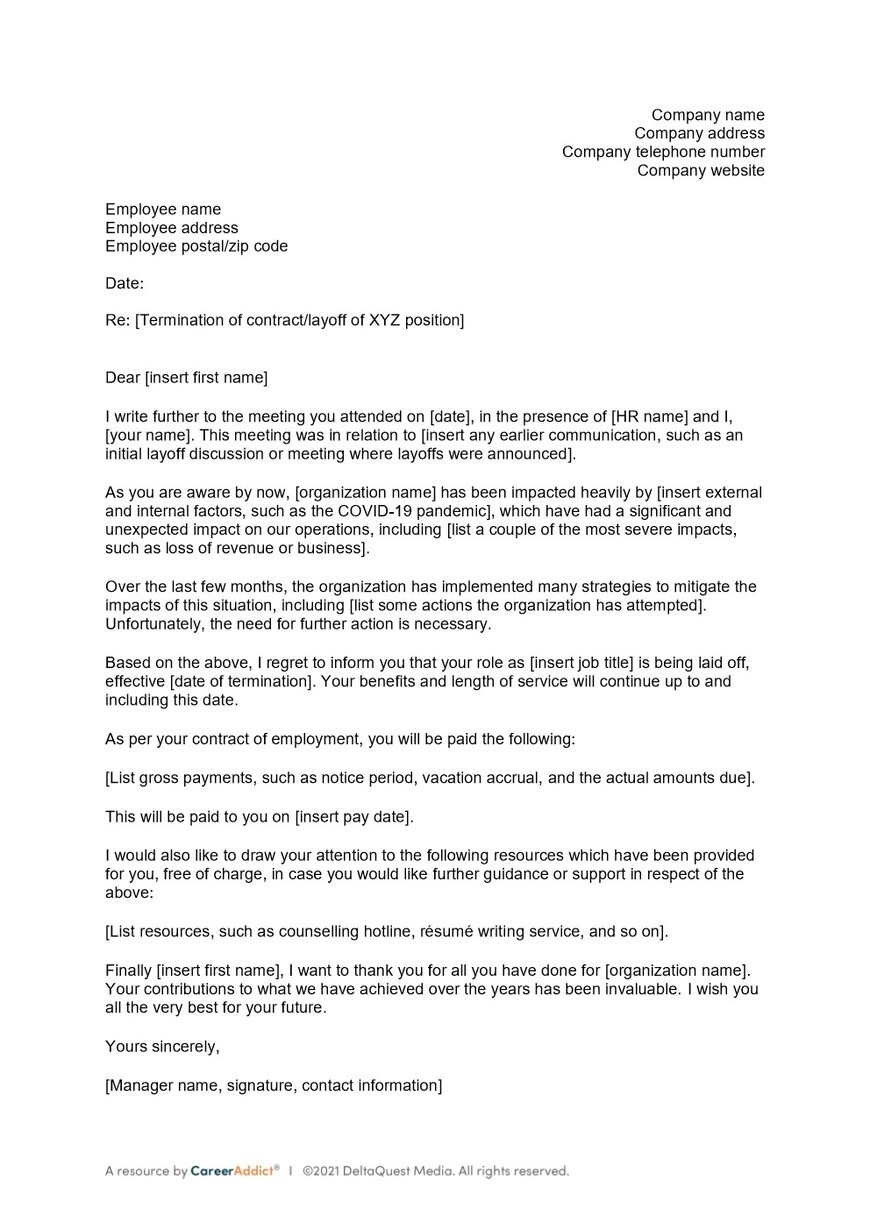Reconsidering A Job Offer After Layoff: Smart Strategies And Questions To Ask

Table of Contents
Evaluating the Job Offer in Light of Your Layoff
A job offer after a layoff presents a unique situation. While the immediate need for income is significant, rushing into a decision can have long-term consequences. A thorough evaluation is essential, focusing on several key areas.
Assessing Financial Stability
The financial implications are paramount. Your previous salary and benefits served as a baseline; the new offer needs careful scrutiny against that standard.
- Compare compensation: Does the new salary match or exceed your previous earnings, considering bonuses and benefits? Factor in any severance pay you received from your previous employer.
- Analyze short-term and long-term impacts: How will this salary impact your existing savings and debt obligations? Can you comfortably meet your financial responsibilities?
- Assess future growth: Does the new role offer potential for salary increases, promotions, and long-term financial security? Look at the company’s track record of employee compensation growth.
- Key Considerations:
- Short-term vs. long-term financial implications: Consider the immediate needs versus the potential for long-term financial stability.
- Impact of severance pay on your decision: Factor in any severance pay you received to ensure a clear financial picture.
- Assessing health insurance options: Compare the new health insurance plan to your previous coverage, considering deductibles, premiums, and co-pays.
Considering the Company Culture and Stability
Financial stability is only one piece of the puzzle. Company culture and stability directly influence job satisfaction and long-term career prospects.
- Research the company's reputation: Use online resources like Glassdoor, LinkedIn, and company websites to understand the company culture and employee reviews.
- Analyze financial health: Review the company’s financial reports and news articles to assess its stability and growth potential. Is it a financially sound organization with a promising future?
- Evaluate the work environment: Consider if the company culture aligns with your work style and preferences. A toxic work environment can negate the benefits of a good salary.
- Key Considerations:
- Reviewing employee reviews on sites like Glassdoor: Gauge employee satisfaction and identify potential red flags.
- Analyzing news articles and financial reports about the company: Assess the company's financial health and long-term prospects.
- Assessing the company's commitment to employee development: Determine whether the company invests in its employees' growth and provides opportunities for advancement.
Aligning the Job with Your Career Goals
Beyond immediate needs, consider how the job aligns with your long-term career aspirations.
- Long-term career trajectory: Does the role offer opportunities for skill development and career advancement that aligns with your professional goals?
- Professional development: Does the company provide training, mentoring, or other professional development opportunities?
- Challenging work: Does the job offer a challenging and stimulating environment that will help you grow professionally?
- Key Considerations:
- Does the role challenge you professionally? Seek a role that allows you to utilize and expand your skillset.
- Does it offer opportunities for skill development? Look for roles that provide training and development opportunities.
- Does it align with your long-term career path? Consider how this position contributes to your overall career goals.
Essential Questions to Ask Before Accepting (or Rejecting)
Before making a final decision, arm yourself with the right questions to clarify all aspects of the job offer.
Clarifying Job Responsibilities and Expectations
Avoid ambiguity by asking detailed questions about the role's day-to-day demands.
- Specific tasks and responsibilities: Get a clear understanding of your daily tasks and responsibilities.
- Performance metrics: Ask about the key performance indicators (KPIs) and how your performance will be measured.
- Team dynamics and reporting structure: Understand the team dynamics, your reporting structure, and your colleagues.
- Key Questions:
- Questions regarding specific projects: Understand the scope and complexity of projects you'll be involved in.
- Clarification on performance reviews and feedback: Understand the process for receiving feedback and performance evaluations.
- Understanding team collaboration expectations: Clarify how teamwork operates within the company.
Negotiating Compensation and Benefits
Don't hesitate to negotiate; your experience and market value are valuable assets.
- Salary negotiation: Research industry benchmarks to determine your market value and confidently negotiate your salary.
- Benefits negotiation: Consider negotiating benefits crucial to you, such as vacation time, remote work options, or professional development stipends.
- Market research: Utilize online resources and networking to research average compensation for similar roles in your area.
- Key Negotiation Strategies:
- Strategies for salary negotiation: Research industry standards and confidently present your value.
- Researching average compensation for similar roles: Use this information to support your negotiation.
- Negotiating benefits packages: Prioritize the benefits most important to you and negotiate accordingly.
Understanding Company Policies and Support Systems
Inquire about company policies and support systems to ensure a positive and productive work environment.
- Work-life balance: Ask about company policies regarding work-life balance, flexible hours, and remote work options.
- Employee assistance programs: Inquire about any employee assistance programs (EAPs) or resources available for employee well-being.
- Training and development: Ask about opportunities for training, professional development, and career advancement.
- Key Questions:
- Understanding company policy on vacation time: Clarify the company's vacation policy and accrual rates.
- Clarifying remote work options: Determine the feasibility and terms of remote work arrangements.
- Inquiries about mentorship programs and professional development opportunities: Explore opportunities for career growth within the company.
Seeking External Advice and Support
Don't underestimate the value of seeking external perspectives before making a significant career decision.
- Trusted advisors: Discuss the offer with trusted friends, family members, or mentors who can offer unbiased support and advice.
- Career counselor: Consider consulting a career counselor or coach for objective guidance and professional insights.
- Professional networks: Leverage your professional network (LinkedIn, industry groups) to seek advice from individuals in your field.
- Key Benefits of Seeking External Advice:
- Benefits of seeking objective external advice: Gain a fresh perspective and identify potential blind spots.
- Finding trustworthy career advisors: Seek guidance from experienced professionals who can offer valuable insights.
- Utilizing professional networks for guidance: Tap into your network for advice and insights from those in similar situations.
Conclusion
Reconsidering a job offer after a layoff requires a careful and deliberate approach. Thoroughly evaluating the financial implications, company stability, and alignment with your career goals is crucial. Asking insightful questions, negotiating effectively, and seeking external advice will empower you to make a confident and informed decision. Don't rush into accepting a new position; take the time you need to make an informed decision about your next career move after a layoff. Remember, careful consideration and thoughtful planning can significantly impact your future success.

Featured Posts
-
 Sunken Wwii Vessel Reveals Remarkable Find A Preserved Car
Apr 26, 2025
Sunken Wwii Vessel Reveals Remarkable Find A Preserved Car
Apr 26, 2025 -
 How Middle Management Drives Efficiency And Improves Employee Engagement
Apr 26, 2025
How Middle Management Drives Efficiency And Improves Employee Engagement
Apr 26, 2025 -
 Analyzing The Language Used To Describe Gavin Newsom
Apr 26, 2025
Analyzing The Language Used To Describe Gavin Newsom
Apr 26, 2025 -
 Hanoi Hai Phong Luxury Train Launch Date Set For May
Apr 26, 2025
Hanoi Hai Phong Luxury Train Launch Date Set For May
Apr 26, 2025 -
 Unmasking The Stinky Congressman A Shocking Revelation
Apr 26, 2025
Unmasking The Stinky Congressman A Shocking Revelation
Apr 26, 2025
